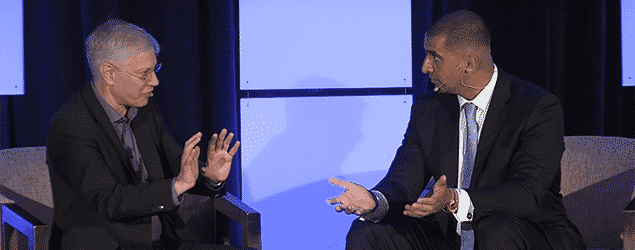Anniversary Chapters: Gregory Salmieri Discusses “Atlas Shrugged on the Role of the Mind in Man’s Existence”

“Ayn Rand described the theme of her novel Atlas Shrugged as the role of the mind in human existence,” says Gregory Salmieri, “and I thought it would be good to have a piece summarizing what the novel had to say about that topic.”
The result was a chapter — one of two he contributed to Robert Mayhew’s Essays on Ayn Rand’s “Atlas Shrugged” — called “Atlas Shrugged on the Role of the Mind in Man’s Existence.” We’re talking with various contributors to the Mayhew volume in celebrating the 60th anniversary of the novel’s publication.
“Reason is the distinctly human form of consciousness,” Salmieri explains. “Animals can observe and remember particular things and form expectations about how similar looking things will behave. But it’s reason that enables us to acquire and organize whole bodies of knowledge about items that aren’t perceptibly similar, and may not be perceptible at all, but which have a common nature in light of which we are able to understand their other common features and actions.”
Salmieri teaches philosophy at Rutgers University and is a philosophy fellow at the Anthem Foundation. He is co-editor (with Allan Gotthelf) of A Companion to Ayn Rand, and he and ARI fellow Ben Bayer are currently leading The Atlas Project, an eight-month long weekly discussion of Atlas Shrugged taking place on Facebook.
“There are two key aspects of reason’s role that the novel illustrates by showing a world in which they are in short supply,” he observes. “The first is that reason is the productive faculty — the faculty by which we create everything we need to survive. Though this has often been denied in various forms, it’s been known since at least the time of the ancient Greeks. Still Rand had a distinctive and more comprehensive view of reason’s role here, which I try to bring out in the essay.
“The other aspect of reason’s role is that it’s the valuing faculty. It’s the faculty by which we conceive of and commit to goals, and as such it’s the source of all our passions, even our love of our own lives — for those of us who do love our lives. Here Rand’s view is utterly unique, and it’s most fully developed in Atlas.”
Here’s a sample paragraph from early in the chapter:
What the positive characters [in Atlas Shrugged] share is not a certain degree of intelligence, but the commitment to using such intelligence as they do possess. Similarly, the villains are not portrayed as lacking intelligence — indeed [Robert] Stadler is a genius; rather their evil consists in a choice to subvert their minds. The consistent position of the novel is that, though there are differences in degrees of intelligence, we all possess the faculty of reason, and it can and should play the same role in each of our lives. What unites the men of the mind, is not genius, but “an unbreached rationality” — “not the degree of your intelligence, but the full and relentless use of your mind, not the extent of your knowledge, but the acceptance of reason as an absolute.” [Notes omitted]
If you’re intrigued by these perspectives, Essays on Ayn Rand’s “Atlas Shrugged” is available here, and more on Atlas Shrugged is available here. Also, stay tuned for an upcoming blog post in which Salmieri will discuss his other chapter in the Mayhew volume, “Discovering Atlantis: Atlas Shrugged’s Demonstration of a New Moral Philosophy.”



